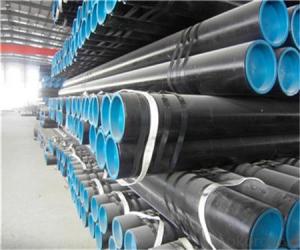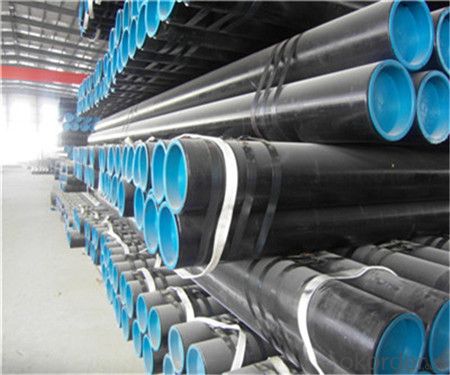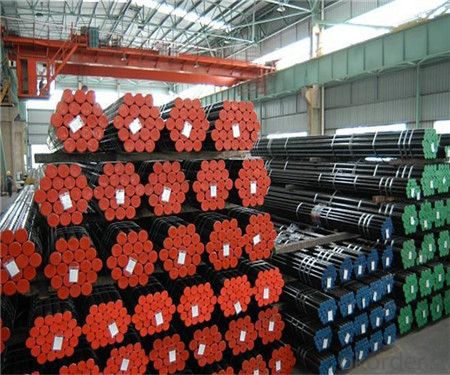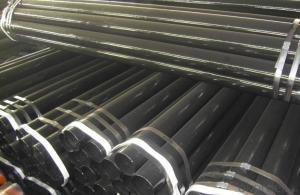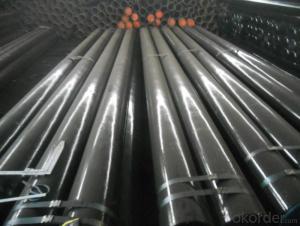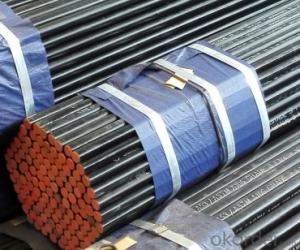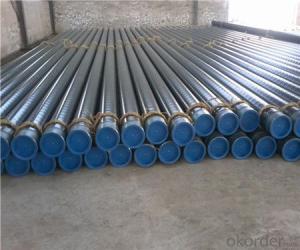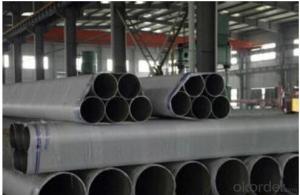Seamless Steel Pipe ASTM A106, ASTM A53, ISO3183-2-1996 GB3087 China Manufacturer
- Loading Port:
- Tianjin
- Payment Terms:
- TT OR LC
- Min Order Qty:
- 30 m.t.
- Supply Capability:
- 12000 m.t./month
OKorder Service Pledge
OKorder Financial Service
You Might Also Like
Product Description:
1、CS SEAMLESS PIPE ASTM A53/ ASTM A106/ API 5L GR B description:
Seamless pipe is formed by drawing a solid billet over a piercing rod to create the hollow shell.
As the manufacturing process does not include any welding, seamless pipes are perceived to be stronger and more reliable.
Historically seamless pipe was regarded as withstanding pressure better than other types, and was often more easily available than welded pipe.
2、CS SEAMLESS PIPE ASTM A53/ ASTM A106/ API 5L GR B Features :
• High manufacturing accuracy
• High strength
• Small inertia resistance
• Strong heat dissipation ability
• Good visual effect
• Reasonable price
3、Standard :GB5310: Seamless Steel Tubes And Pipes for High Pressure Boiler
● Application: For manufacture heating-pipelines, containers, coal-saving devices, super heaters and reheaters
of high pressure boilers(P>9.8Mpa,450℃
after consulting with customers.
4、Packaging & Delivery of CS SEAMLESS PIPE ASTM A53/ ASTM A106/ API 5L GR B
Packaging Details: | seaworthy package,bundles wrapped with strong steel strip |
Delivery Detail: | 30-45days after received 30%TT |
CS SEAMLESS PIPE ASTM A53/ ASTM A106/ API 5L GR B Images:
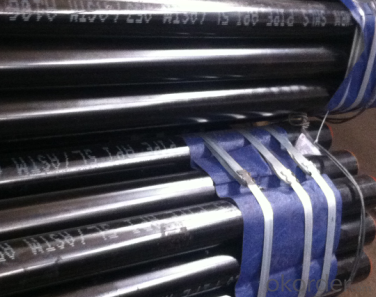
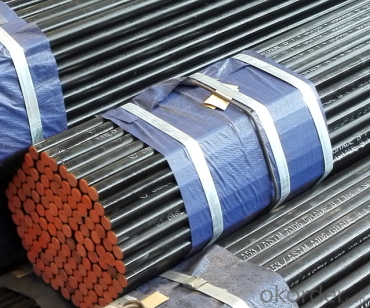
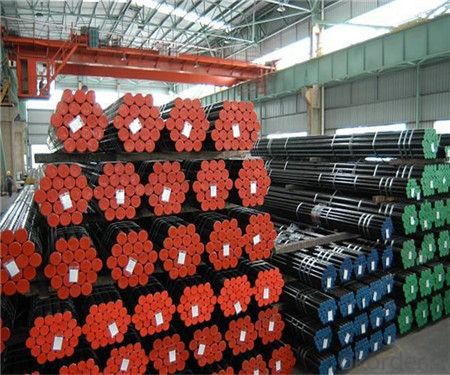
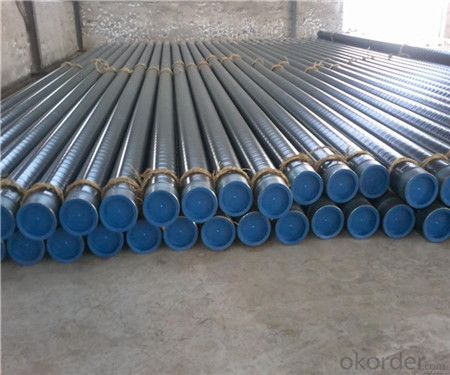
FAQ of Seamless Pipe ASTM A106/53:
①Quality
Our products are manufactured strictly according to national and internaional standard, and we take a test
on every pipe before delivered out. If you want see our quality certifications and all kinds of testing report, please just ask us for it.
Guaranteed: If products’ quality don’t accord to discription as we give or the promise before you place order, we promise 100% refund.
②Price
Yes, we are factory and be able to give you lowest price below market one, and we have a policy that “ for saving time and absolutely honest business attitude, we quote as lowest as possible for any customer, and discount can be given according to quantity”,if you like bargain and factory price is not low enough as you think, just don’t waste your time.Please trust the quotation we would give you, it is professional one.
Why us?
Professional teams ensure a high efficiency of your purchase
▲ Professional sales team
▲ Professional engineering and technology team
▲ Professional exportation and contract processing/management team
▲ Professional cooperators and partners
Looking forward to doing the corporation with you
Any question, kindly feel free to contact us !
- Q: What are the environmental benefits of using steel pipes?
- Using steel pipes has multiple environmental benefits: 1. Longevity: Steel pipes have a prolonged lifespan, minimizing the need for frequent replacements. This conserves resources and reduces waste generation. 2. Recyclability: Steel is extensively recycled worldwide. When steel pipes reach the end of their life, they can be easily recycled and used to produce new steel products. This reduces the demand for raw materials and saves energy that would otherwise be necessary for manufacturing new materials. 3. Decreased carbon emissions: Steel pipes have a lower carbon footprint compared to materials like concrete or plastic. The manufacturing process emits fewer greenhouse gases, contributing to an overall lower carbon footprint. 4. Corrosion resistance: Steel pipes exhibit high resistance to corrosion, requiring less maintenance and repair compared to other materials. This reduces the need for chemical coatings and treatments that can have detrimental environmental effects. 5. Water conservation: Steel pipes are commonly used in water supply and distribution systems. Their smooth interiors minimize friction, reducing the energy required to pump water through the pipes. This conserves energy and decreases carbon emissions associated with water transportation. 6. Fire resistance: Steel pipes are inherently fire-resistant, making them a safer choice for various applications. In the event of a fire, steel pipes help contain the spread of flames and minimize environmental damage. In summary, the use of steel pipes provides numerous environmental benefits, including durability, recyclability, reduced carbon emissions, water conservation, and fire resistance. These factors make steel pipes a sustainable option for various infrastructure projects.
- Q: Can steel pipes be used for underground stormwater drainage?
- Yes, steel pipes can be used for underground stormwater drainage. Steel pipes are commonly used in underground drainage systems due to their durability, strength, and resistance to corrosion. They can effectively manage the flow of stormwater and provide long-lasting solutions for underground drainage needs.
- Q: How do steel pipes handle extreme temperatures?
- Steel pipes are highly durable and can handle extreme temperatures due to their inherent strength and heat resistance. They have a high melting point, allowing them to withstand both very high and very low temperatures without compromising their structural integrity. Additionally, steel pipes have excellent thermal conductivity, which enables them to efficiently transfer heat and prevent damage caused by extreme temperature fluctuations.
- Q: What are the advantages of using pre-fabricated steel pipes?
- There are several advantages of using pre-fabricated steel pipes in various applications. Firstly, pre-fabricated steel pipes offer a high level of durability and strength. Steel is known for its robustness and resistance to external forces, making it an ideal material for constructing pipes that need to withstand high pressure or heavy loads. This durability ensures that pre-fabricated steel pipes have a longer lifespan compared to other materials, reducing the need for frequent replacements and maintenance. Secondly, pre-fabricated steel pipes provide excellent corrosion resistance. Steel pipes are often coated with protective layers, such as galvanization or epoxy, which prevent rusting and corrosion. This corrosion resistance is particularly crucial when the pipes are used in industries or environments where they may come into contact with moisture, chemicals, or other corrosive substances. By utilizing pre-fabricated steel pipes, the risk of leaks, deterioration, or failure due to corrosion is significantly reduced. Another advantage of pre-fabricated steel pipes is their versatility and ease of installation. These pipes are manufactured to precise specifications before being delivered to the site, allowing for quick and efficient installation. Their modular nature means that they can be easily assembled, disassembled, and reconfigured as needed, making them suitable for a wide range of applications, from industrial settings to residential construction. Moreover, pre-fabricated steel pipes can be easily integrated with other building components, such as fittings, valves, and connectors, ensuring a seamless connection and reducing installation time and costs. Furthermore, pre-fabricated steel pipes are more environmentally friendly compared to other materials. Steel is a highly recyclable material, and using pre-fabricated pipes reduces the consumption of natural resources and energy required for their production. Additionally, the long lifespan of steel pipes reduces waste generation and the need for frequent replacements, further contributing to sustainability efforts. Lastly, pre-fabricated steel pipes offer cost advantages. While the initial cost of steel pipes may be higher than some other materials, their durability and low maintenance requirements result in long-term cost savings. The reduced need for repairs, replacements, and maintenance, as well as the ease of installation, translates into lower overall project costs and reduced downtime. In summary, the advantages of using pre-fabricated steel pipes include durability, corrosion resistance, versatility, ease of installation, environmental friendliness, and cost-effectiveness. These benefits make pre-fabricated steel pipes a preferred choice for various industries and applications.
- Q: How are steel pipes used in LNG terminals?
- Steel pipes are used in LNG terminals for the transportation of liquefied natural gas from storage tanks to various processing units within the terminal. These pipes are designed to withstand the extreme cold temperatures and high pressure of LNG, ensuring safe and efficient transfer of the gas. Additionally, steel pipes are also used for the distribution of LNG to various end-users, such as power plants or industrial facilities, providing a reliable and robust infrastructure for the delivery of this valuable energy source.
- Q: Can steel pipes be used for stormwater management systems?
- Yes, steel pipes can be used for stormwater management systems. Steel pipes are a commonly used material for stormwater management due to their durability, strength, and resistance to corrosion. They can effectively carry and transport stormwater, making them suitable for various applications in stormwater management systems.
- Q: What is the load-bearing capacity of steel pipes?
- The load-bearing capacity of steel pipes varies depending on factors such as pipe diameter, wall thickness, and the type of steel used. However, steel pipes generally have high load-bearing capacities due to their strength and durability.
- Q: What are the different grades of steel used for manufacturing pipes?
- The different grades of steel used for manufacturing pipes include carbon steel, alloy steel, stainless steel, and duplex steel.
- Q: The plastic pipe and steel pipe difference
- In fact, including the steel plastic pipe plastic pipe, but on the market all the steel plastic pipe and plastic lining steel pipe is synonymous, lined with plastic pipe is made of galvanized steel pipe internal set of plastic pipe manufacturing process, process using high pressure steam to both adhesion.
- Q: How are steel pipes used in the manufacturing of agricultural machinery and equipment?
- Due to their various advantageous properties, steel pipes have become widely utilized in the production of agricultural machinery and equipment. These pipes are employed in multiple ways to improve the efficiency and durability of such machinery. A primary application of steel pipes in agricultural machinery is their use in constructing frames and chassis. The exceptional strength and structural integrity of steel pipes make them an ideal choice for supporting heavy loads and enduring the demanding conditions often encountered in agricultural operations. Whether it is a tractor, combine harvester, or tillage equipment, steel pipe frames provide the necessary stability and sturdiness required for these machines to function efficiently in the field. Another common use of steel pipes in agricultural machinery is within hydraulic systems. These pipes function as conduits for hydraulic fluids, ensuring the smooth and reliable operation of various components, such as hydraulic cylinders, pumps, and motors. Thanks to their corrosion resistance and ability to withstand high pressure, steel pipes contribute to the longevity of hydraulic systems, reducing maintenance and repair costs for agricultural machinery. Moreover, steel pipes find application in the exhaust systems of agricultural equipment. To minimize environmental impact and maintain engine performance, it is essential to safely and efficiently expel the exhaust gases produced by engines. Steel pipes with suitable thickness and thermal resistance are employed in constructing exhaust systems, enabling the effective removal of exhaust gases while reducing noise pollution. Additionally, steel pipes are utilized in the manufacturing of irrigation systems and equipment used in agriculture. Whether it involves transporting water from a source to the fields or distributing water to crops through sprinklers or drip irrigation, steel pipes provide the necessary durability and pressure resistance for efficient water delivery while minimizing leaks. In conclusion, the incorporation of steel pipes in the manufacturing of agricultural machinery and equipment plays a vital role in enhancing their performance, durability, and efficiency. The exceptional strength, structural integrity, corrosion resistance, and high pressure capabilities of steel pipes make them indispensable components in various applications within the agricultural sector.
Send your message to us
Seamless Steel Pipe ASTM A106, ASTM A53, ISO3183-2-1996 GB3087 China Manufacturer
- Loading Port:
- Tianjin
- Payment Terms:
- TT OR LC
- Min Order Qty:
- 30 m.t.
- Supply Capability:
- 12000 m.t./month
OKorder Service Pledge
OKorder Financial Service
Similar products
Hot products
Hot Searches
Related keywords
